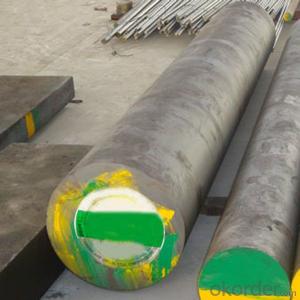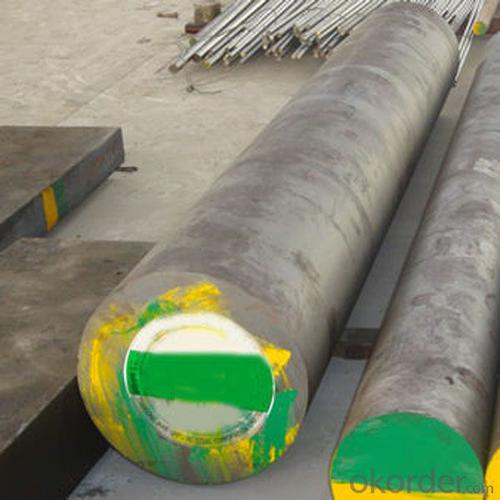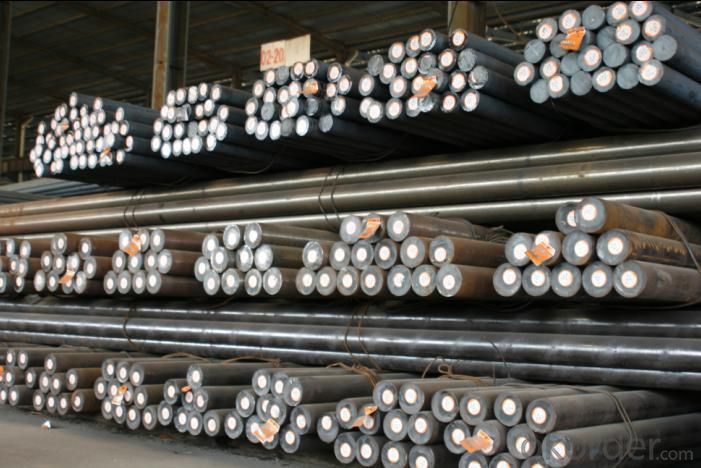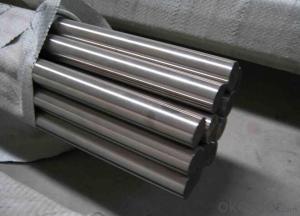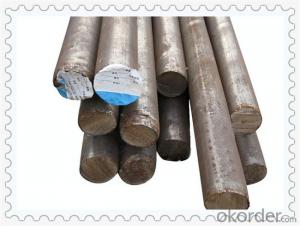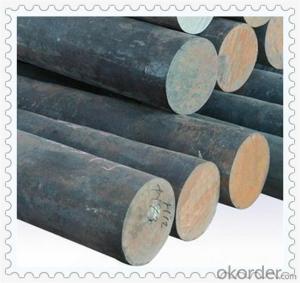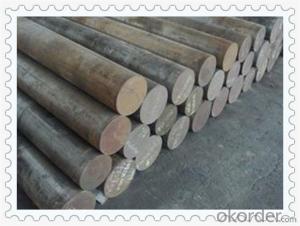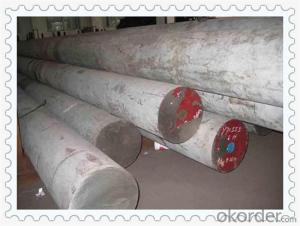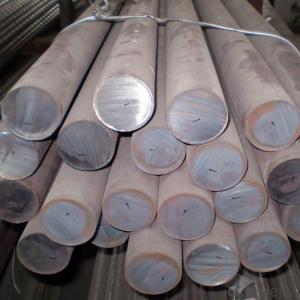SCM440 42CrMo4 Alloy Structural Steel Round Bar
- Loading Port:
- China main port
- Payment Terms:
- TT OR LC
- Min Order Qty:
- 30 m.t.
- Supply Capability:
- 10000 m.t./month
OKorder Service Pledge
OKorder Financial Service
You Might Also Like
Specification
SCM440 42CrMo4 Alloy Structural Steel Round Bar
Product Information:
Diameter:10mm-700mm
Length:3000mm-12000mm Straightness: 3mm/M max
Process:EAF + LF + VD + Forged + Heat Treatment (optional)
Delivery condition:Hot forged +Rough machined (black surface after Q/T)+ Turned (optional)
Delivery Time:30-45 days
MOQ:30at treatment:
Normalized / Annealed / Quenched / tempered
Technical Data:According to the customer's requirement of Chemical Composition, Physical Properties and Mechanical Testing
Test:Ultrasonic test according to SEP 1921-84 G3 C/c
Marking:Grade, heat NO. length will be stamped one each bar with required color
Payment:30% advance by T\T, the balance against B/L
Application:Statically and dynamically stressed components for vehicles, engines and machines. For parts of larger cross-sections, crankshafts, gears.
Product Overviews:
| Product Name | Typical Grades | Diameter(mm) | Standard adopted |
| Carbon Steel | 20 (1020/S20C/C22) | Ø16-Ø300 | GB/SAE/JIS/DIN |
| 40 (1040/S40C/C40) | |||
| 45 (1045/S45C/C45) | |||
| Bearing Steel | GCr9 (51100/SUJ1) | Ø12-Ø250 | |
| GCr15 (52100/SUJ2/100Gr6) | |||
| GCr9SiMn (A485-Gr.1/SUJ3) | |||
| Cr-Mo Steel | 20Cr (5120/SCr420H/20Cr4) | Ø12-Ø250 | |
| 40Cr (5140/SCr440/41Cr4) | |||
| 42CrMo(4140/SCM440/42CrMo4) | |||
| Gear Steel | 20CrNiMo | Ø16-Ø600 | |
| 20CrMn(5115/SMnC420/20MnCr5) | |||
| 20CrNiMo(8620/SNCM220/20CrMiMo2) |
Product Show:

Our Advantages:
· Industry experience over 20 years.
· Shipment of goods -More than 70 countries worldwide.
· The most convenient transport and prompt delivery.
· Competitive price with best service.
· High technical production line with top quality products.
· High reputation based on best quality products.
With our experienced, enthusiastic and dynamic staffs, we assure to bring you the products with best quality, reasonable prices and good after-sales services under the motto: Friends First, Business After.
Communication, Experience, Expertise and Best efforts are our Promises to you.
- Q: What are the main advantages of using special steel in the medical field?
- The main advantages of using special steel in the medical field are its exceptional strength, corrosion resistance, and biocompatibility. These properties make it suitable for manufacturing surgical instruments, implants, and medical devices that require high durability, hygiene, and compatibility with the human body.
- Q: How does special steel perform in terms of corrosion resistance in acidic environments?
- Special steel, which is also referred to as stainless steel, is highly esteemed for its exceptional resistance to corrosion in various environments, including those with acidic conditions. It is composed of a minimum of 10.5% chromium, which generates a protective layer called a passive film on the surface of the steel. This passive film acts as a barrier, preventing direct contact between the steel and the corrosive elements found in acidic environments. The chromium content in special steel enables it to react with oxygen in the atmosphere, resulting in the formation of a thin and transparent oxide layer. This oxide layer is extremely stable and capable of self-repair, which contributes to stainless steel's high resistance to corrosion caused by acids. Moreover, the presence of other alloying elements like nickel and molybdenum further enhances its ability to withstand acidic corrosion. Special steel displays excellent resistance to both general corrosion and localized corrosion, such as pitting and crevice corrosion, in acidic environments. It can endure a wide range of acid concentrations and temperatures, making it suitable for various applications in industries such as chemical processing, pharmaceuticals, and marine environments where exposure to acidic solutions is prevalent. It is worth noting that the performance of special steel in acidic environments may vary depending on the specific grade and composition of the steel. Different grades of stainless steel possess varying levels of alloying elements, which can affect their corrosion resistance properties. Therefore, it is crucial to select the appropriate grade of special steel that matches the particular acidic environment in order to ensure optimal performance and longevity.
- Q: How does special steel contribute to improving product lifespan?
- Special steel contributes to improving product lifespan in several ways. Firstly, it offers enhanced durability and strength, allowing products to withstand heavy usage, high temperatures, and harsh environments without succumbing to wear and tear. This increased resilience helps prevent premature failure and extends the lifespan of the product. Additionally, special steel often possesses excellent corrosion resistance properties, protecting the product from rust and degradation caused by exposure to moisture or chemicals. Moreover, special steel's superior machinability and formability enable the production of complex and precise components, reducing the risk of structural flaws or defects that could compromise the product's lifespan. Overall, the use of special steel in manufacturing contributes significantly to producing long-lasting, reliable, and high-quality products.
- Q: What are the different galvanizing techniques used for special steel?
- There are several galvanizing techniques used for special steel, each with its own advantages and considerations. Some common techniques include hot-dip galvanizing, electro-galvanizing, and mechanical galvanizing. Hot-dip galvanizing involves immersing the steel in a bath of molten zinc, creating a thick, durable coating. Electro-galvanizing uses an electric current to deposit a thin layer of zinc onto the steel surface. Mechanical galvanizing, also known as centrifuge galvanizing, uses centrifugal force to apply a zinc coating. Each technique has its own specific applications and benefits, depending on factors such as the desired thickness of the coating, the complexity of the steel structure, and the intended use of the galvanized steel.
- Q: How does special steel contribute to the mining industry?
- Special steel contributes to the mining industry by offering enhanced durability, high strength, and resistance to extreme conditions. It is used in various mining equipment and machinery, such as drills, excavators, and crushers, to withstand the harsh environment and increase efficiency. Additionally, special steel alloys with specific properties are utilized in mining processes like ore extraction and mineral processing, ensuring optimum performance and reducing downtime.
- Q: How does special steel contribute to sustainability?
- Special steel contributes to sustainability in several ways. Firstly, it is highly durable and has a longer lifespan compared to traditional steel, reducing the need for frequent replacements and minimizing waste. Additionally, special steel can be recycled and reused multiple times without losing its properties, reducing the demand for new raw materials and energy consumption in the production process. Furthermore, special steel offers superior strength and lightweight characteristics, enabling the development of more fuel-efficient vehicles and structures, thus reducing carbon emissions. Overall, special steel's durability, recyclability, and energy efficiency make it a key material in promoting sustainable practices in various industries.
- Q: What are the different heat treatment defects in special steel?
- There are several heat treatment defects that can occur in special steel during the heat treatment process. Some of the most common defects include: 1. Decarburization: This occurs when the surface layers of the steel lose carbon due to exposure to high temperatures in an oxygen-rich environment. Decarburization can lead to reduced hardness and strength in the treated steel. 2. Quench cracking: Also known as cracking during quenching, this defect occurs when the steel undergoes rapid cooling after being heated. The differential cooling rates can cause internal stresses, leading to cracks in the material. 3. Distortion: Distortion refers to the change in shape or dimension of the steel during the heat treatment process. It can occur due to non-uniform heating or cooling, inadequate fixturing, or improper quenching techniques. 4. Soft spots: Soft spots are localized areas of reduced hardness in the treated steel. These spots can occur due to insufficient heating or improper quenching, leading to reduced mechanical strength in those areas. 5. Overheating: Overheating is a defect that occurs when the steel is exposed to excessively high temperatures during the heat treatment process. This can result in grain growth, reduced toughness, and decreased overall material properties. 6. Case hardening problems: Special steels often undergo case hardening processes, such as carburizing or nitriding, to create a hard outer layer. However, several defects can occur during these processes, including insufficient or excessive hardening, poor case depth, or uneven hardness distribution. 7. Residual stresses: Residual stresses are internal stresses that remain in the steel after the heat treatment process. These stresses can lead to dimensional instability, warping, or even cracking if not properly controlled. To avoid or minimize these heat treatment defects, it is crucial to follow proper heat treatment procedures, including precise temperature control, adequate cooling rates, and appropriate fixturing techniques. Additionally, using high-quality heat treatment equipment, monitoring the process closely, and conducting thorough inspections can help detect and address any potential defects in special steel.
- Q: How is free-cutting steel used in the production of precision components?
- Free-cutting steel is used in the production of precision components due to its excellent machinability properties. Its composition includes added elements such as sulfur, lead, or bismuth, which aid in chip breaking and reducing tool wear during machining processes. This steel variant allows for high-speed machining operations, resulting in improved productivity and accuracy when manufacturing precision components.
- Q: What are the different methods of hardening special steel?
- There are several different methods of hardening special steel, including heat treatment, quenching, tempering, and carburizing. Heat treatment involves heating the steel to a specific temperature and then cooling it rapidly to increase its hardness. Quenching involves rapidly cooling the heated steel in a liquid, such as oil or water, to achieve high hardness. Tempering is a process that follows quenching, where the steel is reheated to a lower temperature to reduce brittleness and increase toughness. Carburizing is a method where the steel is heated in a carbon-rich environment to increase its surface hardness by infusing carbon atoms into the outer layer. These methods can be used individually or in combination to achieve desired hardness levels in special steel.
- Q: What are the applications of special steel in the oil and gas supply chain?
- Special steel is widely used in the oil and gas supply chain due to its exceptional properties. It is used for various applications such as pipes, valves, and fittings, where its high strength, corrosion resistance, and ability to withstand extreme temperatures and pressures are crucial. Special steel is also used in equipment like drilling tools, offshore platforms, and storage tanks, ensuring reliability and durability in challenging environments. Additionally, it is employed in the construction of pipelines, providing a reliable and safe mode of transportation for oil and gas products.
Send your message to us
SCM440 42CrMo4 Alloy Structural Steel Round Bar
- Loading Port:
- China main port
- Payment Terms:
- TT OR LC
- Min Order Qty:
- 30 m.t.
- Supply Capability:
- 10000 m.t./month
OKorder Service Pledge
OKorder Financial Service
Similar products
Hot products
Hot Searches
Related keywords
